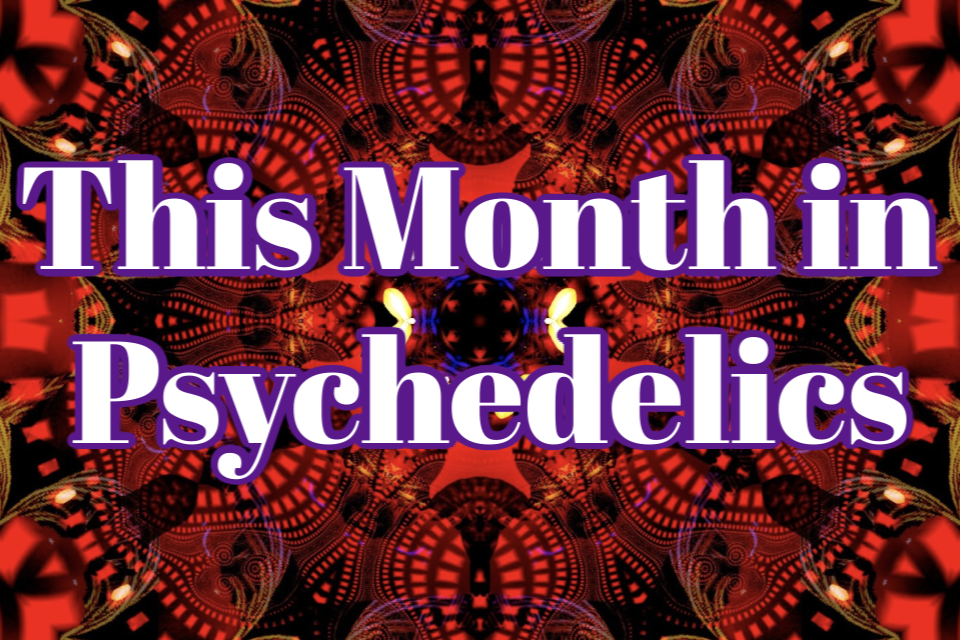A lot of psychedelic news happened this month. The United States held a monumental election and several states and municipalities had progressive drug policy reforms on their ballots. Outside of the election there was a slew of drug policies all around the globe. And there were updates in the realms of psychedelic history, research, therapy, and industry as well. This month’s recap will cover all of the hottest news stories from November 2020.
Here is a slimmed-down video recap version that is available for those who prefer an easier-to-digest option:
Without further ado, let’s jump into the news:
Drugs Won the 2020 Election
November was an incredibly exciting month for drug policy reform advocates in America; every single drug-related ballot measure passed in an unexpected unanimous show of support for relaxing the country’s approach to drugs.
Oregon legalized psilocybin therapy and decriminalized all drugs, Washington D.C. decriminalized natural psychedelics, and seven cannabis initiatives were approved in five states. Soon, residents in Arizona, Montana, New Jersey, and South Dakota will be able to consume cannabis recreationally and patients in Mississippi and South Dakota will have access to medical marijuana. And to top all of this off, four more cities in Ohio approved cannabis decriminalization measures.
However, before you rush out to take advantage of any of these progressive policies, remember that it will take some time before these initiatives go into effect.
And some of them are not quite a done deal yet—cannabis prohibitionists in Mississippi, Montana, and South Dakota are trying to overturn the voter-approved initiatives. Hopefully the will of the voters will prevail. Either way, this widespread acceptance of drug policy reform is a really encouraging thing to see.
Even More Drug Policy Updates
This month there happened to be a lot of drug policy reform action going on in addition to the ballot measures in the United States. On the international level, the Mexican Senate voted to legalize marijuana nationwide, Vancouver voted to decriminalize all drugs, and Argentina altered its medical marijuana rules to allow home cultivation, while New Zealand voted against a cannabis legalization referendum, and Canadian officials declined to support a petition to decriminalize psychedelics.
Here in the United States, lawmakers in Wisconsin voted to allow public cannabis use and New Jersey is working on approving a unique marijuana decriminalization bill containing a special amendment that would also decriminalize psilocybin.
Looking to the future, the U.S. House of Representatives is expected to vote on legalizing cannabis at the federal level this month (supposedly that might even take place this week!), California is considering decriminalizing psychedelics, Washington is working on decriminalizing all drugs and legalizing psilocybin mushrooms for wider therapeutic use, five states are thinking about legalizing weed next year, and Israel and North Macedonia are talking about legalizing cannabis.
Archaeologists Find Evidence of Ceremonial Datura Use in Californian Caves
Drug policy reform wasn’t the only thing going on this month—archaeologists uncovered new evidence of ceremonial datura use in Californian caves.
The site of the discovery is Pinwheel Cave in the southern part of the state, about 80 kilometers northeast of Santa Barbara. The cave gets its name for a large pinwheel-shaped red image made of plant material located on the cave’s ceiling that was once thought to represent a psychedelic trip, but new chemical analyses and electron microscopy positively identified the remnants of the chewed plant materials to be datura.
So this new evidence means that Californians have been tripping for even longer than we previously thought.
Study Finds Psilocybin-Assisted Psychotherapy Relieves Major Depression
A small study of adults with major depression found that psilocybin-assisted psychotherapy resulted in large reductions in depressive symptoms.
This effect was about four times larger than what clinical trials have shown for traditional antidepressants, indicating that psilocybin may be better at treating depression than the medicines currently on the market.
However, this was a preliminary study and more research in this area will need to be conducted before we can definitively say that psilocybin or other psychedelics are better at treating depression than existing pharmaceutical drugs.
First Non-Palliative Canadian Granted Access To Psilocybin Therapy
You might remember back in August that four dying Canadians were granted a legal exemption to receive psilocybin therapy. That exemption originally only applied to people suffering from end-of-life stress and anxiety due to terminal cancer, but this month Canada loosened up a little bit more by granting the first non-palliative Canadian access to psilocybin therapy.
This is a pretty big deal and it follows the rest of this month’s predominant theme—the relaxing of drug policies worldwide. Canada is one of the countries leading the charge and it’s great to see that patients who suffer from psychological conditions like depression and anxiety, instead of an incurable disease like cancer, are going to be able to start receiving legal psychedelic therapy as well.
Additional Top Stories
Peter Thiel led a $125 million funding round for a Berlin-based psychedelic startup.
Usona Institute is offering psilocybin to psychedelic researchers for free.
Psymposia published an epic series about the history of mining companies within the psychedelic industry called “From Mining to Mushrooms”.
A first-of-its-kind trial found that psilocybin is effective at treating migraines.
That’s all for this month’s update. Remember to always test and weigh your drugs and until next time—keep thinking wilder.
Think Wilder is reader-supported. If you enjoyed this month’s update, please consider helping out by becoming a patron, making a one-time donation, or sharing this post with a friend. Thank you for your support.










